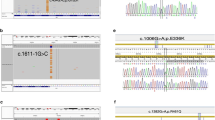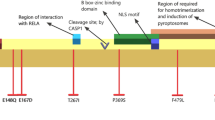Abstract
The MEFV gene, responsible for familial Mediterranean fever (FMF), is involved in inflammatory reactions through altered leukocyte apoptosis, secretion of interleukin (IL)-1β, and activation of the NF-κ B pathway. Ulcerative Colitis (UC) and FMF are both characterized by a recurrent pattern of presentation with periods of remission and flares associated with neutrophilic infiltration at the site of injury. The aim of this study was to investigate the possible correlation between UC and MEFV gene alterations. Twenty-five consecutive, first-diagnosed and untreated UC patients, 28 control patients with rheumatoid arthritis, and 65 normal individuals were analyzed. Nonisotopic RNase Cleavage Assay (NIRCA) was applied as a first-step mutational screening method of exons 10 and 2 of MEFV gene; direct sequencing was subsequently performed to confirm the results. MEFVmutations were identified in 7 (3 M694V/0, 2 M680I/0, 1 E148Q/E148Q, and 1 A744S/0) out of 25 UC patients versus 1 (M694V/0) out of 28 rheumatoid arthritis patients (P = .0199) and 1 (M694V/0) out of 65 healthy controls (P = .0004). Four out of 7 patients with MEFVmutations had inflammatory arthritis, a clinical finding that was not observed in the 18 UC patients with unmutated MEFV (P = .0028). Patients with UC almost universally carried the T A C G MEFV exon 2 haplotype in contrast with normal individuals (P < .0001) and FMF patients (P = .0310). In conclusion the increased frequency of mutations of MEFV in UC patients, especially in those with episodic arthritis, suggests a possible modifying effect of MEFV in the disease process and its localization within the joint. The difference in distribution of MEFV exon 2 haplotypes between UC patients and both FMF patients and normal individuals, suggests that UC patients constitute a genetically distinct population. Larger, longitudinal studies are needed to confirm these initial findings.
Similar content being viewed by others
References
Livneh A, Langevitz P, Zemer D, et al.: Criteria for the diagnosis of familial Mediterranean fever. Arthritis Rheum 40:1879–1885, 1997
The French FMF Consortium: A candidate gene for familial Mediterranean fever. Nat Genet 17:25–31, 1997
The International FMF Consortium: Ancient missense mutations in a new member of the RoRet gene family are likely to cause familial Mediterranean fever. Cell 90:797–807, 1997
Sarrauste de Menthiere C, Terriere S, Pugnere D, Ruiz M, Demaille J, Touitou I: INFEVERS: the Registry for FMF and hereditary inflammatory disorders mutations. Nucleic Acids Res 31:282–285, 2003
Ritis K, Giaglis S, Spathari N, et al.: Non-isotopic RNase cleavage assay for mutation detection in MEFV, the gene responsible for familial Mediterranean fever, in a cohort of Greek patients. Ann Rheum Dis 63:438–443, 2004
Konstantopoulos K, Kanta A, Deltas C, et al.: Familial Mediterranean fever associated pyrin mutations in Greece. Ann Rheum Dis 62:479–481, 2003
Hiller S, Kohl A, Fiorito F, Herrmann et al.: NMR structure of the apoptosis- and inflammation-related NALP1 pyrin domain. Structure (Camb) 11:1199–205, 2003
McDermott MF: A common pathway in periodic fever syndromes. Trends Immunol 25:457–460, 2004
Chae JJ, Komarow HD, Cheng J, et al.: Targeted disruption of pyrin, the FMF protein, causes heightened sensitivity to endotoxin and a defect in macrophage apoptosis. Mol Cell 11:591–604, 2003
McDermott MF, Aksentijevich I: The autoinflammatory syndromes. Curr Opin Allergy Clin Immunol 2:511–516, 2002
Stehlik C, Lee SH, Dorfleutner A, Stassinopoulos A, Sagara J, Reed JC: Apoptosis-associated speck-like protein containing acaspase recruitment domain is a regulator of procaspase-1 activation. J Immunol 171:6154–6163, 2003
Podolsky DK: Inflammatory bowel disease. N Engl J Med 347:417–429, 2002
Farrell RJ, Peppercorn MA: Ulcerative colitis. Lancet 359:331–340, 2002
Cattan D, Notarnicola C, Molinari N, Touitou I: Inflammatory bowel disease in non-Ashkenazi Jews with familial Mediterranean fever. Lancet 355:378–379, 2000
Lichtenberger GS, Flavell RA, Alexopoulou L: Innate immunity and apoptosis in IBD. Inflamm Bowel Dis 10(Suppl 1):58–62, 2004
Fidder H, Chowers Y, Ackerman Z, et al.: The familial Mediterranean fever (MEVF) gene as a modifier of Crohn’s disease. Am J Gastroenterol 100:338–343, 2005
Karban A, Dagan E, Eliakim R, et al.: Prevalence and significance of mutations in the familial Mediterranean fever gene in patients with Crohn’s disease. Genes Immun 6:134–139, 2005
Hommes DW, van Deventer SJ: Endoscopy in inflammatory bowel diseases. Gastroenterology 126:1561–1573, 2004
Goldrick MM, Kimball GR, Liu Q, Martin LA, Sommer SS, Tseng JY: NIRCA: a rapid robust method for screening for unknown point mutations. BioTechniques 21:106–112, 1996
Aldea A, Calafell F, Arostegui JI, et al.: The West Side Story: MEFVhaplotype in Spanish FMF patients and controls, and evidence of high LD and a recombination “hotspot” at the MEFV locus. Hum Mutat 23:399–406, 2004
Tunca M, Kirkali G, Soyturk M, Akar S, Pepys MB, Hawkins PN: Acute phase response and evolution of familial Mediterranean fever. Lancet 353:1415, 1999
Fidder HH, Chowers Y, Lidar M, Sternberg M, Langevitz P, Livneh A: Crohn disease in patients with familial Mediterranean fever. Medicine (Baltimore) 81:411–416, 2002
Mor A, Gal R, Livneh A: Abdominal and digestive system associations of familial Mediterranean fever: Am J Gastroenterol 98:2594–2604, 2003
Diaz A, Hu C, Kastner DL, et al.: Lipopolysaccharide-induced expression of multiple alternatively spliced MEFV transcripts in human synovial fibroblasts. Arthritis Rheum 50:3679–3689, 2004
Author information
Authors and Affiliations
Corresponding author
Rights and permissions
About this article
Cite this article
Giaglis, S., Mimidis, K., Papadopoulos, V. et al. Increased Frequency of Mutations in the Gene Responsible for Familial Mediterranean Fever (MEFV) in a Cohort of Patients with Ulcerative Colitis: Evidence for a Potential Disease-Modifying Effect?. Dig Dis Sci 51, 687–692 (2006). https://doi.org/10.1007/s10620-006-3192-1
Received:
Accepted:
Issue Date:
DOI: https://doi.org/10.1007/s10620-006-3192-1




